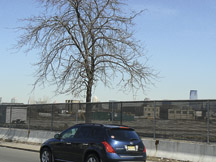If Robert Harper had his way, he would have moved out of his apartment on Union Street in Jersey City years ago. Harper has spent the past year working with neighbors and doing research to find out just how much chromium is located at a property at 900 Garfield Ave. that is less than a block from him.
Chrome was produced on the site from the 1920s until the 1960s. Chromium was used in a variety of industrial applications, including metal plating, the manufacture of stainless steel, and the production of colored glass.
The waste product of the process was hexavalent chromium, a highly toxic contaminant that is thought to be the cause of many health problems, including cancer.
The site is scheduled for a cleanup by Pittsburgh-based PPG Industries, Inc., which operated at the site from 1954 to 1963, as part of a settlement agreement reached in February between the state, the city of Jersey City, and PPG.
The settlement mandates that PPG clean up, within five years, soil and sources of chromium contamination at the property along Garfield Avenue. PPG also has agreed to complete remediation at 13 other chromium-contaminated sites in Jersey City, Weehawken, and Bayonne.
The public may comment on the settlement until April 15. The public can also ask questions and comment at a public meeting this Monday, March 30, at City Hall, 280 Grove St., Jersey City, starting at 7 p.m. In addition, the public can mail their comments to: Thomas Cozzi, Assistant Director, NJDEP, 401 East State St., P.O. Box 028, Trenton N.J. 08625.
“It is as bad as a modern day Chernobyl.” – Robert Harper
________
“The big question is how you put your arms around a problem that is so extensive,” Harper said. “It is as bad as a modern day Chernobyl.”
A spreading problem
Harper and others have created the Garfield Avenue Chromium Coalition, which has a website (http://blog.ga-cc.com) outlining why a thorough cleanup is needed.
One of the things visitors to the site will see is the number “300,000” as in 300,000 tons of chromium that the coalition has claimed is on the site, based on their research and in consultation with various legal and environmental experts working with them on this issue. The coalition is concerned that the chromium cleanup will only take into consideration the site and not other land where the chromium could have spread by wind via dust or by water.
“Chromium has gone into the open sewers on Garfield and other streets, which is vast contamination,” Harper said. “Peoples’ lives are at stake.” He has video taped some of the chromium runoff in the area and posted it on YouTube.
Also, Harper and others such as the neighborhood group GRACO (Garfield, Randolph, Arlington, Clerk, Claremont, Carteret, and Ocean) are skeptical that the cleanup may not be stringent enough and that PPG may not be sincere about the cleanup. They say that the company took a long time to come to a settlement. Harper said his research has found that PPG has reserved over $190 million for their cleanup in Hudson County, but he believes it will cost three to four times more.
GRACO has retained an environmental lawyer to look into legal action to ensure a thorough cleanup, and both Garfield Avenue Chromium Coalition and GRACO have gotten the support of the Hudson County-based Interfaith Community Organization, which, along with the Natural Resources Defense Council (NRDC), filed a citizens’ lawsuit in February against PPG in federal court to get the Garfield Avenue site cleanup started.
PPG’s stance
PPG spokesperson Jeremy Neuhart commented last week about the settlement: “It provides a process that will result in the remediation of 900 Garfield Avenue and the other chrome sites for which PPG is responsible without further litigation. The process includes a communications plan that will provide a forum for all members of the community to have a say in clean-ups.”
He added: “The clean-up at 900 Garfield Avenue and any other site with a residential end-use will be conducted in accordance with NJDEP’s stringent residential standards; and a court-appointed site administrator will oversee the cleanup process, establishing a master schedule that will have judicially enforceable deadlines.”
The NJDEP is the New Jersey Department of Environmental Protection, which is responsible for overseeing the cleanup of all contaminated sites in the state.
On the issue of cost, Neuhart said even though PPG set aside $193 million for the 14 Hudson County sites mentioned in the settlement, if the Garfield Avenue site cost exceeds that amount, then PPG will “fund the clean-up fully” under the terms of an administrative consent order it signed with the state in 1990 to clean up all its sites.
PPG said that at least 500,000 tons of soil may be affected at the 14 sites, but did not specify how many tons of chromium are on the Garfield Avenue site.
Ricardo Kaulessar can be reached at rkaulessar@hudsonrreporter.com.
